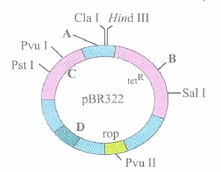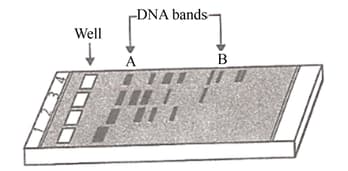MEDIUM
NEET
IMPORTANT
Earn 100
Identify A, B, C and D in the given figure of E. coli cloning vector pBR322 and select the correct option.

(a)
| A | B | C | D |
|---|---|---|---|
| HindI | EcoRI | ampR | ori |
(b)
| A | B | C | D |
|---|---|---|---|
| HindI | BamHi | kanR | ampR |
(c)
| A | B | C | D |
|---|---|---|---|
| BamHI | PstI | ori | Amp |
(d)
| A | B | C | D |
|---|---|---|---|
| EcoRI | BamHI | ampR | ori |
100% studentsanswered this correctly

Important Questions on Biotechnology - Principles and Processes
EASY
NEET
IMPORTANT
MEDIUM
NEET
IMPORTANT
(i) Electrophoresis is a technique used for the separation of molecules based on their size and charge.
(ii) Plasmids are extra-chromosomal, self-replicating, usually circular, double stranded DNA molecules found naturally in many bacteria and also in some yeast.
(iii) It is not advisable to use an exonuclease enzyme while producing a recombinant DNA molecule.
(iv) In EcoRI, the roman numeral I indicates that it was the first enzyme isolated from E.coli RY 13.
MEDIUM
NEET
IMPORTANT
MEDIUM
NEET
IMPORTANT
EASY
NEET
IMPORTANT
EASY
NEET
IMPORTANT
MEDIUM
NEET
IMPORTANT

(i) It represents a typical agarose gel electrophoresis in which lane 1 contains undigested DNA.
(ii) Smallest DNA bands are formed at A and largest DNA bands are formed at B.
(iii) The separated DNA fragments can be visualized after staining in the visible light.
(iv) The separated DNA bands are cut out from the agarose gel and extracted from the gel piece. This step is known as elution.
EASY
NEET
IMPORTANT
